28 start with Y start with Y

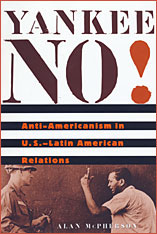
In 1958, angry Venezuelans attacked Vice President Richard Nixon in Caracas, opening a turbulent decade in Latin American–U.S. relations. In Yankee No! Alan McPherson sheds much-needed light on the controversial and pressing problem of anti-U.S. sentiment in the world.
Examining the roots of anti-Americanism in Latin America, McPherson focuses on three major crises: the Cuban Revolution, the 1964 Panama riots, and U.S. intervention in the Dominican Republic. Deftly combining cultural and political analysis, he demonstrates the shifting and complex nature of anti-Americanism in each country and the love–hate ambivalence of most Latin Americans toward the United States. When rising panic over “Yankee hating” led Washington to try to contain foreign hostility, the government displayed a surprisingly coherent and consistent response, maintaining an ideological self-confidence that has outlasted a Latin American diplomacy torn between resentment and admiration of the United States.
However, McPherson warns, U.S. leaders run a great risk if they continue to ignore the deeper causes of anti-Americanism. Written with dramatic flair, Yankee No! is a timely, compelling, and carefully researched contribution to international history.


From Paris to Peking, from Saigon to Washington, the pillars of the postwar world tottered on the brink of collapse in 1968. Year of the Heroic Guerrilla is the first global analysis of that universal upheaval.
Daniels vividly depicts the great crises of that era: the Tet offensive and the abdication of Lyndon Johnson; the denouncement of the counterculture; the fissuring of the civil rights movement and the assassination of Martin Luther King, Jr.; the student revolt at Columbia University; the May uprising in France that nearly overthrew the Fifth Republic; the "cultural revolution" in China; the chilling of the Prague Spring by the Soviet army; and, finally, the convention and riots in Mayor Daley's Chicago, signaling the downturn of the revolutionary spirit in America.


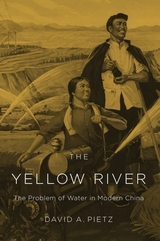
Flowing through the heart of the North China Plain—home to 200 million people—the Yellow River sustains one of China’s core regions. Yet this vital water supply has become highly vulnerable in recent decades, with potentially serious repercussions for China’s economic, social, and political stability. The Yellow River is an investigative expedition to the source of China’s contemporary water crisis, mapping the confluence of forces that have shaped the predicament that the world’s most populous nation now faces in managing its water reserves.
Chinese governments have long struggled to maintain ecological stability along the Yellow River, undertaking ambitious programs of canal and dike construction to mitigate the effects of recurrent droughts and floods. But particularly during the Maoist years the North China Plain was radically re-engineered to utilize every drop of water for irrigation and hydroelectric generation. As David A. Pietz shows, Maoist water management from 1949 to 1976 cast a long shadow over the reform period, beginning in 1978. Rapid urban growth, industrial expansion, and agricultural intensification over the past three decades of China’s economic boom have been realized on a water resource base that was acutely compromised, with effects that have been more difficult and costly to overcome with each passing decade. Chronicling this complex legacy, The Yellow River provides important insight into how water challenges will affect China’s course as a twenty-first-century global power.
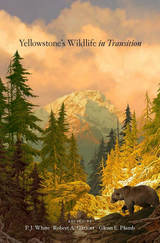
The world's first national park, Yellowstone is a symbol of nature's enduring majesty and the paradigm of protected areas across the globe. But Yellowstone is constantly changing. How we understand and respond to events that are putting species under stress, say the authors of Yellowstone's Wildlife in Transition, will determine the future of ecosystems that were millions of years in the making. With a foreword by the renowned naturalist E. O. Wilson, this is the most comprehensive survey of research on North America's flagship national park available today.
Marshaling the expertise of over thirty contributors, Yellowstone's Wildlife in Transition examines the diverse changes to the park's ecology in recent decades. Since its creation in the 1870s, the priorities governing Yellowstone have evolved, from intensive management designed to protect and propagate depleted large-bodied mammals to an approach focused on restoration and preservation of ecological processes. Recognizing the importance of natural occurrences such as fires and predation, this more ecologically informed oversight has achieved notable successes, including the recovery of threatened native species of wolves, bald eagles, and grizzly bears.
Nevertheless, these experts detect worrying signs of a system under strain. They identify three overriding stressors: invasive species, private-sector development of unprotected lands, and a warming climate. Their concluding recommendations will shape the twenty-first-century discussion over how to confront these challenges, not only in American parks but for conservation areas worldwide. Highly readable and fully illustrated, Yellowstone's Wildlife in Transition will be welcomed by ecologists and nature enthusiasts alike.


Yenching University was perhaps the most impressive example of Sino-Western cooperation in the twentieth century. From its founding in 1916 by Western missionaries until the Communist victory, Yenching mirrored the colorful and frustrating efforts of Chinese and Western liberals to find solutions to China's overriding preoccupation with national salvation. In charting the ebb and flow of university life, this definitive work sheds light on the intellectual, social, and diplomatic forces at work in this transitional period in Chinese history.
Philip West's analysis of the Yenching episode is carefully placed within the political context, both domestic and foreign, of the Republican years (1912–1949). But the author sees intercultural history as being more than an extension of politics and diplomacy. The early bond between Chinese and Westerners at Yenching, despite its fame as an educational institution, was a religious one. Rising national consciousness, student radicalization, and China's unending experience of war weakened that religious tie. And yet religious purposes are a part of the Yenching story to the end.
In his handling of intercultural history, West has a keen appreciation for the interplay of political forces and individuals. The demise of Yenching and the breakdown of Sino-Western relations generally are seen in terms of the individual behavior of Yenching personalities, the pressures of Communist ideology, and also Western diplomacy surrounding the Korean War. Throughout this study major attention is given to the pivotal role of that towering personality in Sino-Western relations, John Leighton Stuart, Yenching's longtime president and the last American Ambassador to China prior to the Communist takeover.
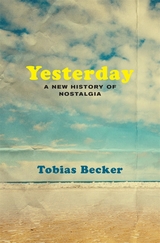
A sweeping reassessment of our longing for the past, from the rise of “retro” to the rhetoric of Brexit and Trump.
Nostalgia has a bad reputation. Its critics dismiss it as mere sentimentality or, worse, a dangerous yearning for an imagined age of purity. And nostalgia is routinely blamed for trivializing the past and obscuring its ugly sides. In Yesterday, Tobias Becker offers a more nuanced and sympathetic view. Surveying the successive waves of nostalgia that swept the United States and Europe after the Second World War, he shows that longing for the past is more complex and sometimes more beneficial than it seems.
The current meaning of “nostalgia” is surprisingly recent: until the 1960s, it usually just meant homesickness, in keeping with the original Greek word. Linking popular culture to postwar politics in the United States, Great Britain, and Germany, Becker explains the shift in meaning. He also responds to arguments against nostalgia, showing its critics as often shortsighted in their own ways as they defend an idea of progress no less naïve than the wistfulness they denounce. All too often, nostalgia itself is criticized, as if its merit did not depend on which specific past one longs for.
Taking its title from one of the most popular songs of all time, and grounded in extensive research, Yesterday offers a rigorous and entertaining perspective on divisive issues in culture and politics. Whether we are revisiting, reviving, reliving, reenacting, or regressing, and whether these activities find expression in politics, music, fashion, or family history, nostalgia is inevitable. It is also powerful, not only serving to define the past but also orienting us toward the future we will create.
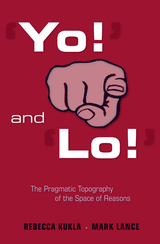
Much of twentieth-century philosophy was organized around the “linguistic turn,” in which metaphysical and epistemological issues were approached through an analysis of language. This turn was marked by two assumptions: that it was primarily the semantics of language that was relevant to broader philosophical issues, and that declarative assertions were the only verbal acts of serious philosophical interest. In ‘Yo!’ and ‘Lo!’ Rebecca Kukla and Mark Lance reject these assumptions. Looking at philosophical problems starting with the pragmatics of language, they develop a typology of pragmatic categories of speech within which declaratives have no uniquely privileged position. They demonstrate that non-declarative speech acts—including vocative hails (“Yo!”) and calls to shared attention (“Lo!”)—are as fundamental to the possibility and structure of meaningful language as are declaratives.
Entering into conversation with the work of Anglo-American philosophers such as Wilfrid Sellars, Robert Brandom, and John McDowell, and Continental philosophers including Heidegger and Althusser, ‘Yo!’ and ‘Lo!’ offers solutions (or dissolutions) to long-standing philosophical problems, such as how perception can be both inferentially fecund and responsive to an empirical world, and how moral judgment can be both objective and inherently motivating.

The Yogaśāstra and its voluminous auto-commentary, the Svopajnavrtti, is the most comprehensive treatise on Śvetāmbara Jainism. Written in the twelfth century by the polymath Hemacandra, it was instrumental in the survival and growth of Jainism in India as well as in the spreading of Sanskrit culture within Jaina circles. Its influence extended far beyond confessional and geographical borders and it came to serve as a handbook for the Jain community in Gujarat and overseas.
It is a systematic presentation of a set of ideas and practices originally belonging to the Śvetāmbara canonical scriptures and traditions molded into a coherent whole with the help of a long row of scholastic thinkers. Hemacandra integrates innovations of his own as well as non-Jain elements of pan-Indian and Saiva provenance, attesting to a strong Tantric influence on medieval Jainism. Some of these elements came to be perpetually included within Śvetāmbara orthopraxy and orthodoxy due to the normative status acquired by the Yogaśāstra.
The present translation is the first of its kind in a Western language.
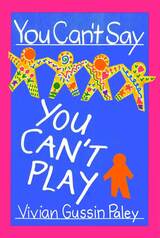
Who of us cannot remember the pain and humiliation of being rejected by our classmates? However thick-skinned or immune to such assaults we may become as adults, the memory of those early exclusions is as palpable to each of us today as it is common to human experience. We remember the uncertainty of separating from our home and entering school as strangers and, more than the relief of making friends, we recall the cruel moments of our own isolation as well as those children we knew were destined to remain strangers.
In this book Vivian Paley employs a unique strategy to probe the moral dimensions of the classroom. She departs from her previous work by extending her analysis to children through the fifth grade, all the while weaving remarkable fairy tale into her narrative description. Paley introduces a new rule—“You can’t say you can’t play”—to her kindergarten classroom and solicits the opinions of older children regarding the fairness of such a rule. We hear from those who are rejected as well as those who do the rejecting. One child, objecting to the rule, says, “It will be fairer, but how are we going to have any fun?” Another child defends the principle of classroom bosses as a more benign way of excluding the unwanted.
In a brilliant twist, Paley mixes fantasy and reality, and introduces a new voice into the debate: Magpie, a magical bird, who brings lonely people to a place where a full share of the sun is rightfully theirs. Myth and morality begin to proclaim the same message and the schoolhouse will be the crucible in which the new order is tried. A struggle ensues and even the Magpie stories cannot avoid the scrutiny of this merciless pack of social philosophers who will not be easily caught in a morality tale.
You Can’t Say You Can’t Play speaks to some of our most deeply held beliefs. Is exclusivity part of human nature? Can we legislate fairness and still nurture creativity and individuality? Can children be freed from the habit of rejection? These are some of the questions. The answers are to be found in the words of Paley’s schoolchildren and in the wisdom of their teacher who respectfully listens to them.

p>Young Children Learning provides vivid insight into the way young children think, talk, and learn from their mothers. It reveals the richness of the home as a learning environment and shows how much children can learn through the ordinary conversations of everyday life.
The book describes a research study in which four-year-old girls were tape-recorded talking to their mothers at home and to their teachers at nursery school. At home the children range freely over a wide variety of topics--work, the family, birth, growing up, death. They talk about plans for the future and puzzle over such diverse topics as the shapes of roofs and chairs, the nature of Father Christmas, and whether the queen wears curlers in bed. In many conversations the children are actively struggling to understand a new idea or the meaning of an unfamiliar word. These "passages of intellectual search" show the children to be persistent and logical thinkers.
In sharp contrast, the conversations between these same children and their nursery school teachers lack richness, depth, and variety. The questioning, puzzling child is gone: in her place is a child who seems subdued and whose conversations with adults are mainly restricted to answering questions rather than asking them. These observations show how strongly young children can be affected by the move from one setting to another, and they suggest that, even at the nursery stage, children reserve their best thinking for outside the classroom, with a resulting compartmentalization of the knowledge they acquire at school.
The book challenges the widely held belief that parents need to learn from professionals how to educate and bring up their children; above all, it persuades us to value parenting more highly and to have respect for the intellectual capabilities of young minds.


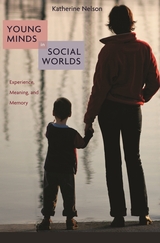
Katherine Nelson re-centers developmental psychology with a revived emphasis on development and change, rather than foundations and continuity. She argues that children be seen not as scientists but as members of a community of minds, striving not only to make sense, but also to share meanings with others.
A child is always part of a social world, yet the child's experience is private. So, Nelson argues, we must study children in the context of the relationships, interactive language, and culture of their everyday lives.
Nelson draws philosophically from pragmatism and phenomenology, and empirically from a range of developmental research. Skeptical of work that focuses on presumed innate abilities and the close fit of child and adult forms of cognition, her dynamic framework takes into account whole systems developing over time, presenting a coherent account of social, cognitive, and linguistic development in the first five years of life.
Nelson argues that a child's entrance into the community of minds is a slow, gradual process with enormous consequences for child development, and the adults that they become. Original, deeply scholarly, and trenchant, Young Minds in Social Worlds will inspire a new generation of developmental psychologists.
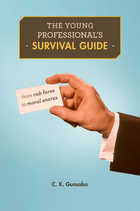
Imagine yourself in your new job, doing your best to make a good impression—and your boss asks you to do something that doesn’t feel right, like fudge a sales report, or lie to a customer. You have no idea how to handle the situation, and your boss is hovering. When you’re caught off guard, under pressure from someone more powerful, it’s easy to make a mistake. And having made one, it’s easier to rationalize the next one.
The Young Professional’s Survival Guide shows how to avoid these traps in the first place, and how to work through them if you can’t avoid them. Many of the problems that arise in the workplace are predictable. C. K. Gunsalus, a nationally recognized expert on professional ethics, uses short, pungent real-world examples to help people new to the work world recognize the situations that can lead to career-damaging missteps—and prevent them. Gunsalus offers questions to ask yourself (and others) to help you recognize trouble and temptation, sample scripts to use to avoid being pressured into doing something you’ll regret, and guidance in handling disputes fairly and diplomatically. Most of all, she emphasizes, choose your mentors for their characters as well as their titles and talents.
You can’t control the people around you, but you can control what you do. Reliance on a few key habits and a professional persona, Gunsalus shows, can help you advance with class, even in what looks like a “casual” workplace.
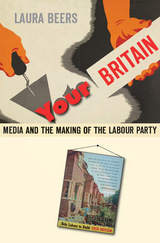
In the early twentieth century, new mass media—popular newspapers, radio, film—exploded at the same time that millions of Britons received the vote in the franchise expansions of 1918 and 1928. The growing centrality of the commercial media to democratic life quickly became evident as organizations of all stripes saw its potential to reach new voters. The new media presented both an exciting opportunity and a significant challenge to the new Labour Party.
Laura Beers traces Labour’s rise as a movement for working-class men to its transformation into a national party that won a landslide victory in 1945. Key to its success was a skillful media strategy designed to win over a broad, diverse coalition of supporters. Though some in the movement harbored reservations about a socialist party making use of the “capitalist” commercial media, others advocated using the media to hammer home the message that Labour represented not only its traditional base but also women, office workers, and professionals. Labour’s national leadership played a pivotal role in the effective use of popular journalism, the BBC, and film to communicate its message to the public. In the process Labour transformed not only its own national profile but also the political process in general.
New Labour’s electoral success of the late twentieth century was due in no small part to its grasp of media communication. This insightful book reminds us that the importance of the mass media to Labour’s political fortunes is by no means a modern phenomenon.
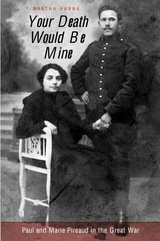
Paul and Marie Pireaud, a young peasant couple from southwest France, were newlyweds when World War I erupted. With Paul in the army from 1914 through 1919, they were forced to conduct their marriage mostly by correspondence. Drawing upon the hundreds of letters they wrote, Martha Hanna tells their moving story and reveals a powerful and personal perspective on war.
Civilians and combatants alike maintained bonds of emotional commitment and suffered the inevitable miseries of extended absence. While under direct fire at Verdun, Paul wrote with equal intensity and poetic clarity of the brutality of battle and the dietary needs (as he understood them) of his pregnant wife. Marie, in turn, described the difficulties of working the family farm and caring for a sick infant, lamented the deaths of local men, and longed for the safe return of her husband. Through intimate avowals and careful observations, their letters reveal how war transformed their lives, reinforced their love, and permanently altered the character of rural France.
Overwhelmed by one of the most tumultuous upheavals of the modern age, Paul and Marie found solace in family and strength in passion. Theirs is a human story of loneliness and longing, fear in the face of death, and the consolations of love. Your Death Would Be Mine is a poignant tale of ordinary people coping with the trauma of war.

Your doctor is the second most important person taking care of your health. You're the first. This book was written so that you can do a better job, without going to medical school. It is designed to help you sort out the vital health information you need--what to consider, what to ignore, what to worry about, what to forget.
Deciding how to take care of a pain, an injury, a fever--and whether to call in expert advice--is not always an easy task. Knowing how to prevent disease can be even harder: Will I really live longer and feel better if I cut down on dietary fat, or alcohol, or overwork? The main focus of this book is on prevention: habits you can modify, choices you can make in daily life. Good choices do make a difference. The life expectancy of American adults has been increasing, and it is quite clear that professional medical care is not the only reason people are living longer.
But when you do call in the professionals, this book will guide you in asking the right questions about your diagnosis and treatment. When medical decisions must be made, you can be an active partner in making them.
The doctors who wrote this book have made some fundamental assumptions about their readers: they are people who want to make their own choices about their health, based on the best possible evidence; they want straightforward information unencumbered with excessive detail; when they talk with their physician, they want to ask intelligent questions and understand the answers; they want to live a long life, but also enjoy it along the way; and they want to see "the big picture"--how their personal health is affected by environmental and social forces.
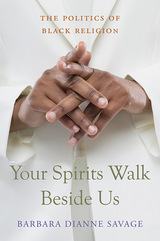
Even before the emergence of the civil rights movement with black churches at its center, African American religion and progressive politics were assumed to be inextricably intertwined. In her revelatory book, Barbara Savage counters this assumption with the story of a highly diversified religious community whose debates over engagement in the struggle for racial equality were as vigorous as they were persistent. Rather than inevitable allies, black churches and political activists have been uneasy and contentious partners.
From the 1920s on, some of the best African American minds—W. E. B. Du Bois, Carter G. Woodson, Benjamin Mays, Nannie Helen Burroughs, Mary McLeod Bethune, Charles S. Johnson, and others—argued tirelessly about the churches’ responsibility in the quest for racial justice. Could they be a liberal force, or would they be a constraint on progress? There was no single, unified black church but rather many churches marked by enormous intellectual, theological, and political differences and independence. Yet, confronted by racial discrimination and poverty, churches were called upon again and again to come together as savior institutions for black communities.
The tension between faith and political activism in black churches testifies to the difficult and unpredictable project of coupling religion and politics in the twentieth century. By retrieving the people, the polemics, and the power of the spiritual that animated African American political life, Savage has dramatically demonstrated the challenge to all religious institutions seeking political change in our time.

“This is the book to throw at your human resources director—not literally, of course—when any attempt is being made to bamboozle you about how decisions on pay have been made…It is a closely argued, thoroughly researched treatise on how we got here and how pay could be both fairer and more effective as a reward.”
—Stefan Stern, Financial World
“A flat-out revelation of a book by one of the nation’s top scholars of the labor market…required reading for anyone who cares about the future of work in America.”
—Matthew Desmond, author of Poverty, by America
“Jake Rosenfeld pulls back the curtain on the multifaceted cultural, institutional, and market forces at play in wage-setting. This timely book illuminates the power dynamics and often arbitrary forces that have contributed to the egregious inequality in the U.S. labor market—and then lays out a clear blueprint for progressive change.”
—Thea Lee, President of the Economic Policy Institute
Job performance and where you work play a role in determining pay, but judgments of productivity and value are highly subjective. What makes a lawyer more valuable than a teacher? How do you measure the output of a police officer, a professor, or a reporter? Why, in the past few decades, did CEOs suddenly become hundreds of times more valuable than their employees? The answers lie not in objective criteria but in battles over interests and ideals.
Four dynamics are paramount: power, inertia, mimicry, and demands for equity. Power struggles legitimize pay for particular jobs, and organizational inertia makes that pay seem natural. Mimicry encourages employers to do what their peers are doing. And workers are on the lookout for practices that seem unfair. Jake Rosenfeld shows us how these dynamics play out in real-world settings, drawing on cutting-edge economics and original survey data, with an eye for compelling stories and revealing details.
You’re Paid What You’re Worth gets to the heart of that most basic of social questions: Who gets what and why?
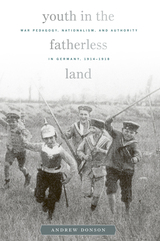
The first comprehensive history of German youth in the First World War, this book investigates the dawn of the great era of mobilizing teenagers and schoolchildren for experiments in state-building and extreme political movements like fascism and communism. It investigates how German teachers could be legendary for their sarcasm and harsh methods but support the world’s most vigorous school reform movement and most extensive network of youth clubs. As a result of the war mobilization, teachers, club leaders, and authors of youth literature instilled militarism and nationalism more deeply into young people than before 1914 but in a way that, paradoxically, relaxed discipline.
In Youth in the Fatherless Land, Andrew Donson details how Germany had far more military youth companies than other nations—as well as the world’s largest Socialist youth organization, which illegally agitated for peace and a proletarian revolution. Mass conscription also empowered female youth, particularly in Germany’s middle-class youth movement, the only one anywhere that fundamentally pitted itself against adults. Donson addresses discourses as well as practices and covers a breadth of topics, including crime, work, sexuality, gender, family, politics, recreation, novels and magazines, social class, and everyday life.



Gerardo Reichel-Dolmatoff spent much of his life studying the oral culture of the Tukano Indians in the Northwest Amazon, including twenty years simply learning the four key Tukanoan languages. Through his translations and commentaries of the yuruparí fertility mythologem and ritual complex, Tukano oral art is revealed as an important expression of tribal philosophical and religious thought.
The four Tukano "texts" in this volume "speak of emotions, paint images, and construct sceneries." They contain coded cultural history and lead us into the meaning of oral traditions: meaning contained in admonitions, instructions, and explanations which constitute the fundamental precepts of social customs, conflict resolution, gender attitudes, and ecology. Reichel-Dolmatoff places the analytical study of South American oral art on a par with the great exegetic traditions of the Old World.
READERS
Browse our collection.
PUBLISHERS
See BiblioVault's publisher services.
STUDENT SERVICES
Files for college accessibility offices.
UChicago Accessibility Resources
home | accessibility | search | about | contact us
BiblioVault ® 2001 - 2024
The University of Chicago Press









